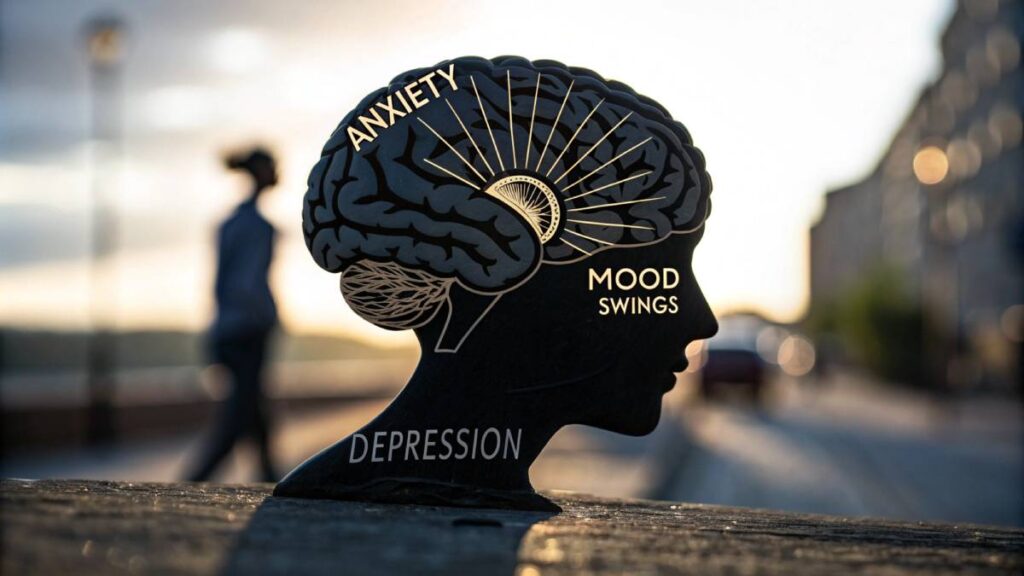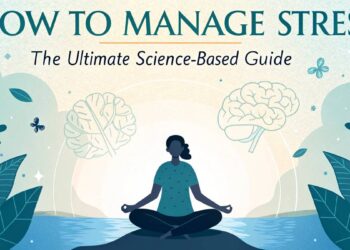Ever feel like stress isn’t just passing through but has set up permanent residence? Chronic stress is the uninvited guest that quietly turns your world upside down—messing with your mind, body, and relationships. It sneaks in, often unnoticed, until its impacts feel overwhelming. In this guide, we uncover the hidden signs of chronic stress and arm you with the tools to tackle it head-on, reclaiming your peace and power.
Key Takeaways
- Definition of Chronic Stress
- Chronic stress is ongoing pressure from various sources (e.g., work, relationships, health) that takes a toll on mental and physical health.
- Mental Health Impacts
- Chronic stress can lead to anxiety, depression, cognitive decline, emotional instability, and social withdrawal.
- Physical Symptoms
- Common indicators include headaches, fatigue, muscle tension, digestive issues, sleep disruptions, and weakened immunity.
- Emotional and Behavioral Effects
- Stress affects mood (anxiety, irritability, depression) and behaviors (social withdrawal, procrastination, substance use).
- Coping Strategies
- Practical solutions like deep breathing, exercise, mindfulness, and therapy can alleviate chronic stress.
Understanding Chronic Stress
Definition of Chronic Stress
Chronic stress is that nagging feeling that just won’t go away—it sticks around like an unwelcome guest, taking a toll on your mental and physical health. While a quick jolt of stress now and then is normal (like when you’re late for work or forget your best friend’s birthday), chronic stress is like the slow drip of a leaky faucet, constantly stressing you out over time. It can come from all sorts of places—maybe your job’s a nightmare, your relationships are complicated, or you’re dealing with health stuff that’s more worry than wellness.

And the sneaky part? Chronic stress can creep up without you even noticing. It’s like a background noise that gradually turns into a roar. If you don’t catch it, you might end up dealing with all sorts of emotional ups and downs and physical aches.
| Type of Stress | Duration | Characteristics |
|---|---|---|
| Acute Stress | Short-term | The constant pressure that can wreck your health if ignored |
| Chronic Stress | Long-term | Constant pressure that can wreck your health if ignored |
Impact of Chronic Stress on Mental Health
Stress isn’t just a mental hiccup—it can really mess with your head. Put up with it for too long, and you might find yourself on an emotional rollercoaster without a safety harness. Here are some ways chronic stress can throw your brain into chaos:
- Anxiety and Depression: Feelings of unease or outright sadness can snowball into full-blown anxiety disorders or depression if chronic stress keeps chipping away at you.
- Cognitive Function: Goodbye brainpower! Chronic stress is like kryptonite for your memory and focus, making it tough to keep your mind sharp on the job or at home.
- Emotional Dysregulation: Managing your emotions? Forget about it! Mood swings and irritability become your new normal, potentially straining your relationships.
- Social Withdrawal: When you can’t handle stress, you might shut yourself off from friends and family, which only makes loneliness feel bigger.
Check out the emotional effects of chronic stress in the table:
| Emotional Impact | Description |
|---|---|
| Anxiety | Stress amps up worry, making everyday life a nerve-racking experience. |
| Depression | Stress shoves you into a pit of despair, where sadness lingers. |
| Mood Swings | Emotions go from zero to sixty—fast, leaving irritability smoldering. |
| Isolation | Stress nudges you towards solitude, pulling you away from your support circle. |
Chronic stress is no joke—it can seriously mess with your mental well-being if left unchecked. Spotting these stress signals early on is crucial. Understand what you’re dealing with to hold more meaningful conversations about mental health, and explore ways to handle stress better. If you’re curious about taming the stress beast, check out our stress management plan.
“Stress is not what happens to us. It’s our response to what happens. And response is something we can choose.” – Maureen Killoran
Physical Symptoms of Chronic Stress
Chronic stress is like that sneaky friend who overstays their welcome, crashing on your couch and refusing to leave. It’s not just in your head—your body gets in on the drama too, waving red flags you can’t ignore. Spotting these signs is your first step to taking back control and getting the help you need. Let’s break down some of these not-so-subtle hints from your body.

Headaches and Fatigue
Your noggin can start throwing tantrums in the form of headaches when stress won’t back off. Tension headaches and migraines come knocking, along with that dragging-your-feet exhaustion. Stress can hit you like a wrecking ball, with tension creeping into your neck and shoulders, making those head-pounding moments even more charming.
| Symptom | Frequency (%) |
|---|---|
| Headaches | 60 |
| Fatigue | 75 |
Know these signs and you’ve got a leg up in fighting stress before it steamrolls you. For a bit of sanity-saving relief, check out our quick stress relief techniques.
Muscle Tension and Digestive Issues
Muscle tension, the unwelcome pressure from stress, makes your body feel like you’re wearing a corset. Stress keeps your muscles tight like a drum, and then there’s the turmoil in your stomach—everything from cramps to constipation to diarrhea, having a party in your gut.
| Symptom | Impact (%) |
|---|---|
| Muscle Tension | 70 |
| Digestive Issues | 50 |
These symptoms are more than just a blip on your radar—they can mess up your day-to-day life. Find some peace by practicing relaxation techniques and being mindful about your eating habits. More tips await in our stress management plan article.
Sleep Problems and Weakened Immune System
Stress and sleep—they’re frenemies at best. Stress keeps you tossing and turning, fueling insomnia and making you feel like a zombie by day. As if that’s not enough, stress even picks on your immune system, opening up the gate for infections because your body’s defense squad is too drained to fight back.
| Symptom | Percentage Affected (%) |
|---|---|
| Sleep Problems | 65 |
| Weakened Immune System | 55 |
Being wise to these symptoms is a game-changer. If these issues are cramping your style, our breathing exercises for stress and lifestyle advice might just be the pep talk you need. Remember, reaching out for help isn’t a sign of weakness; it’s your ticket to feeling better and kicking stress to the curb.
Emotional Symptoms of Chronic Stress
Dealing with chronic stress? You’re not alone, and it’s not just in your head. It can throw your emotions for a loop, making everyday life feel like a never-ending roller coaster ride. Let’s chat about some common emotional symptoms that might pop up when stress sticks around like a bad song in your head.
Anxiety and Irritability
Feel like you’re wired all the time? Chronic stress might have you shaking in your boots with anxiety, even over the little things. It’s like being a soda can that’s been shaken too much; the tiniest thing can set you off.
| Anxiety Symptoms | Irritability Symptoms |
|---|---|
| Always worried | Quick to snap |
| Can’t focus | Fuse gets shorter |
| Panic overload | Touchy like a soft spot |
Catch these feelings before they snowball. Some deep breaths or a nice walk might just take the edge off. We’ve got a handy guide to calm those nerves right here.

Depression and Mood Swings
Stress can flatten your mood like a steamroller and throw you into the depths of sadness or mood swings that rival a soap opera. You might go from tears to cheers faster than changing the TV channel.
| Symptoms of Depression | Symptoms of Mood Swings |
|---|---|
| Endless blues | Emotions on a roller coaster |
| Lost interest in fun stuff | Drama-level reactions |
| Can’t catch any Zs | Ping-pong between feeling great and awful |
Connecting the dots between stress and your feels is important. If this train keeps rolling down the track, a chat with a professional could be the ticket. We’ve got more mental health resources over at our stress management plan.
Feeling Overwhelmed and Unmotivated
When stress is in the driver’s seat, everything feels like climbing a mountain with slippers on. You might lose steam even for things you normally love, like your favorite show or hobby.
| Feelings of Overwhelm | Signs of Lack of Motivation |
|---|---|
| Can’t make up your mind | Dodging any kind of work |
| Stuck in a rut | Skipping your self-care |
| Struggling with simple tasks | Your goals walk out the door |
Fighting back? Start small. Set some mini-goals or do things that light up your world. We’ve got your back with more motivation tips here.
Remember, spotting these emotional symptoms is the first step to getting a better handle on chronic stress. Whether you’re trying new strategies or reaching out for support, taking action can bring some much-needed peace.
Behavioral Symptoms of Chronic Stress
Living under constant stress is like riding a roller coaster you didn’t sign up for. It can mess with your mind and make you do stuff that’s totally not you. Spotting these weird changes in behavior is a big step in figuring out how stress is messing with your life.
Hitting the Booze or Smokes
When stress won’t give you a break, reaching for a drink or lighting up might seem like a quick fix. It’s like your brain tricks you into thinking it’ll all be sunshine and rainbows, even if only for a bit. But hold up, it’s a trap! You can end up needing more and more to feel good, which ain’t doing your health any favors.
| Substance | Folks Saying They’re Using More |
|---|---|
| Alcohol | 30% |
| Nicotine | 25% |
| Recreational Drugs | 15% |
Going Off-Grid and Food Funkiness
Stress can make you feel like pulling a disappearing act, ducking out on friends, and staying home like a hermit. Maybe it’s shame, or just not having the energy for awkward chit-chat. Stress can also mess with your eating habits big time. You might clean out the fridge like it owes you money or lose interest in food altogether, either way, it’s not doing your body any favors.
| What’s Happening | What It Looks Like |
|---|---|
| Social Withdrawal | Becoming a couch potato, dodging friends, going M.I.A. on social media |
| Overeating | Becoming a snack attack machine, putting carbs on a pedestal |
| Undereating | Treating meals like a chore, food becomes meh |
Putting Things Off and Jumpiness
Chronic stress tends to turn you into a professional procrastinator. Tasks pile up and suddenly you’re overwhelmed, leading to even more stress. It’s a vicious cycle. Restlessness is its partner in crime, making you feel like you can’t sit still. It’s all wiggles and jitters, leaving you on edge, ready for action but unable to settle.
| What It Feels Like | Description |
|---|---|
| Procrastination | Dragging your feet on projects, feeling like there’s an elephant on your to-do list |
| Restlessness | Ants in your pants, can’t sit still, feeling like you’re always in a rush |
Picking up on these stress-induced quirks helps in spotting chronic stress. Doing things like practicing chill-out techniques can really turn things around for you. Want more stress-busting tips? Check out these quick stress relief techniques and start feeling better.
Cognitive Symptoms of Chronic Stress
Chronic stress, it’s like having way too many tabs open in your brain. It’s not just a nagging feeling; it messes with your brain’s power to think straight, big time. Folks going through it might grapple with some brain fog and in general life’s a bit fuzzier than it used to be.
Memory and Concentration Issues
Ever walked into a room and forgotten why you did? Chronic stress takes that to a whole new level. Your brain’s like a rusty filing cabinet – things don’t quite stick as well. Those names, dates, and bits of info just slip right through. And good luck trying to buckle down on work with all those stress thoughts tap-dancing in your head.
| Memory Problems | Concentration Hiccups |
|---|---|
| Struggling with names or remembering who’s who | Hard to keep your head in the game at work or school |
| Missed dates or forgot what day it is (who hasn’t?) | Mind wandering off mid-task more than it should |
Racing Thoughts and Poor Judgment
Your brain’s got ants in its pants, jumping from one thought to the next at breakneck speed. Slowing it down is like herding cats. And when you’re tired or frazzled, making smart choices becomes a wild guess. It’s “sell all the stock” on an emotional whim instead of weighing the facts.
Decreased Cognitive Performance
Chronic stress drags down the mental gears, turning a quick spry mind into a sluggish old computer. Just trying to juggle ideas, solve problems, or even catch onto new stuff gets tougher. This can feel like you’re always running uphill at work or school, adding a heap of new stress on top of the pile.
| Brain Power Glitches | What Could Go Wrong |
|---|---|
| Slow as molasses reactions | Pressing hard to get projects in before the clock runs out |
| Learning feels like wrestling a greased pig | Grades or work quality takes a hit |
Nipping these brain bumps in the bud when stressed is a big deal. Finding tricks to handle them can make life way less of a headache. Need some quick tips on stress-busting? Don’t miss our piece on quick stress relief techniques.

Coping Strategies for Chronic Stress
Taming the stress beast isn’t just about survival—it’s about thriving. Below are some down-to-earth ways folks can tackle stress and not just keep their heads above water but truly swim.
Stress Management Techniques
Dealing with stress is kind of like finding that perfect dinner burger—it’s all about technique. Let’s explore some of the go-tos:
| A brisk walk or heart-pumping workout can knock that stress flat. Discover the best exercises for stress. | Details |
|---|---|
| Deep Breathing | You ever notice how a deep breath can take the edge off? For a step-by-step breather, visit breathing exercises for stress. |
| Time Management | Do you ever notice how a deep breath can take the edge off? For a step-by-step breather, visit breathing exercises for stress. |
| Exercise | Do you have a To-Do list stretching into next week? Streamlining tasks helps. Check out time management stress relief. |
| Nature Therapy | Nature’s a great therapist. Check out some fresh air options at nature therapy for stress relief. |
Seeking Professional Help and Support
When stress hits hard, sometimes it takes more than a bubble bath. Professional mental health support can be a trusty co-pilot.
- Therapy: Think of therapy like chatting with a buddy—one with advice that sticks. Hunt down someone who gets stressed like you do.
- Support Groups: Misery loves company, as they say. And there’s power in numbers. Find a group where everybody gets it.
- Hotlines and Online Resources: From call lines to web advice, there’s a lot of help just a click or call away.
For the planners, whip up a stress management plan. Could be your new best friend.
Self-Care Practices and Lifestyle Changes
Giving yourself a little TLC isn’t indulgent—it’s smart. Here are a few tweaks that can ease your stress load:
| Practice | Perks |
|---|---|
| Nutritious Diet | It’s okay to say “nah” sometimes. Look into setting boundaries for stress. |
| Mindfulness and Meditation | A calm mind can slow the roll and sharpen focus. The A-to-Z lives in our [stress relief techniques] guide. |
| Setting Boundaries | It’s okay to say “nah” sometimes. Look into setting boundaries for stress. |
| Journaling | Puts your thoughts on paper and clears your head. Stress journal prompts can help get you started. |
By rolling these practices into your daily groove, you can outsmart stress, find your calm, and keep your sanity intact.
The Importance of Asking for Help
Living under constant stress ain’t no picnic—it can really put a damper on your life. Knowing when to reach out can make a world of difference in handling all that stress.
Spotting a Good Time to Get Help
Figuring out when to call in the pros can be tricky. If any of the following rings a bell, it might be time to get some support:
| If stress symptoms like headaches, fatigue, and muscle tension, are mentioned over at our stress symptoms page, just won’t let up. | What’s Up |
|---|---|
| Can’t Shake It | Stress makes even simple tasks feel like climbing Everest at work or home. |
| Emotional Rollercoaster | Anxiety, irritability, or depression feelings that won’t quit hogging the spotlight. |
| Life in a Funk | Stress making even simple tasks feel like climbing Everest at work or home. |
| Bad Habits | Leaning on unhealthy habits like substance use or avoiding the real world. |
| Going Solo | Shutting out friends and family instead of leaning on them for support. |
Chatting with mental health experts can give folks a bunch of useful tools to keep stress in check.
Where to Turn for Stress Relief
Loads of resources are at the ready for anyone feeling buried under chronic stress. From DIY tricks to pro-filled support, here are some go-tos:
| Type of Resource | What’s in It for You |
|---|---|
| Books and Journals | Check out these stress journal ideas for some introspective downtime. |
| Online Articles | Handy apps like the ones listed in the top stress-relief apps can track stress and offer quick chill-out tips. |
| Mobile Apps | Handy apps like the ones listed in the top stress-relief apps can track stress and offer quick chill-out tips. |
| Workshops and Courses | Join some stress-busting workshops aimed at teaching you the ropes. |
| Therapy and Counseling | A session or two with a therapist specializing in stress might just do the trick. |
| Breathing Drills | Add breathing exercises for stress to your daily lineup for fast stress relief. |
| Get Moving | Discover go-to exercises for beating stress to shake off tension and feel-good vibes. |
Dipping into these options could help you grab the reins on stress and steer towards a happier state of mind.

Supporting Others with Chronic Stress
Chronic stress? Yeah, it’s a bear that can gnaw on anyone – no exceptions. Backing up friends or family who are wrestling with this beast is huge. When you get the hang of offering support, you can seriously enhance their mental health.
“Almost everything will work again if you unplug it for a few minutes, including you.” – Anne Lamott
How to Support Loved Ones
Being there is where it’s at. We’re talking about lending a compassionate ear and heart. Listening to their vent sessions without crowning them with judgment is golden. It’s that whole “sharing is caring” gig – when folks pour out their stresses, they can feel less stranded on Stress Island.
Here’s the scoop on how to stand by them:
| Support Strategies | Description |
|---|---|
| Active Listening | Give ‘em your full attention, nod along, and show you’re tuned in to whatever they’re feeling. |
| Validate Feelings | Tell them it’s cool to be overwhelmed and that you’re there, no cape required. |
| Offer Help | Gently ask what you can do to lend a hand—be it chores or just a little hype squad action. |
Don’t forget the treasure trove of resources that can shine a light on chronic stress symptoms. Chat about stuff like physical symptoms of stress so they get the “aha” moment they’re searching for.
Promoting Mental Health Awareness
Mental health chat? Yeah, it’s a must. Cluing people in about chronic stress swaps out ignorance for understanding vibes. The more we’re in the loop, the less stigma there is, and more love is spread around.
Take a peek at these action steps:
| Awareness Actions | Description |
|---|---|
| Share Information | Use your social feeds to drop some knowledge about stress signs and how to cope. |
| Organize Events | Set up some get-togethers, workshops, or chit-chat circles that shine a light on mental health stuff. |
| Advocate for Resources | Boost the profile of support groups and counseling—the hidden gems of mental health. |
Dial into how stress hormones like cortisol work—it’s a nerdy but cool little peek into what messes with our heads. Dig into our piece on cortisol stress hormone for more.
Providing a Supportive Environment
An earthy zen zone where mental wellness thrives is key. Whether it’s physical or emotional space, fostering tranquility is everyone’s gig.
| Make sure folks feel cozy and chill to express all the feelings and get the help they need. | Description |
|---|---|
| Safe Spaces | Give a nudge towards setting up boundaries stress that fend off overload. |
| Healthy Lifestyle | Make sure folks feel cozy and chill to express all their feelings and get the help they need. |
| Encourage Boundaries | Give a nudge towards setting up boundaries and stress that fend off overload. |
Gift suggestions of self-care and stress busters, chuck a couple of work stress management techniques their way. With these nuggets of wisdom, you’ll be that hero in their story (cape still not required).
Do this, and you’ll help friends and family not just cope, but flat-out thrive, making the community a place filled with more smiles than stress.
Conclusion
Chronic stress might feel like an unbeatable storm, but understanding its symptoms and impacts gives you the power to fight back. From anxiety and mood swings to headaches and fatigue, stress affects every corner of your life. By embracing coping strategies like mindfulness, proper self-care, and professional support, you can regain control and foster resilience. Remember, reaching out for help isn’t a sign of weakness—it’s the strongest step you can take toward a healthier, happier you.
FAQs
What is chronic stress?
Chronic stress is a prolonged state of stress caused by continuous challenges or pressure, negatively affecting mental and physical health.
How does chronic stress affect the body?
It can lead to headaches, fatigue, muscle tension, sleep issues, and a weakened immune system.
Can chronic stress cause emotional symptoms?
Yes, it often results in anxiety, irritability, depression, and mood swings.
What are effective ways to manage chronic stress?
Techniques like deep breathing, regular exercise, mindfulness, and seeking therapy can help manage stress effectively.
When should I seek help for chronic stress?
If symptoms persist and interfere with daily life, professional support is essential for recovery.






